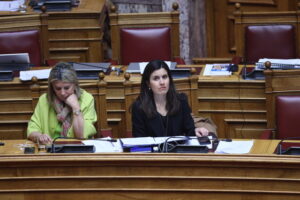The bill of the Ministry of Education, “Arrangements for the Digital Education Portal and the Digital Tutoring Centre, professional orientation in secondary education, measures to support the education system in remote areas”, was passed by a majority, in its first reading, by the Committee for Educational Affairs of the Parliament.
In favour of the principle of the bill were the MPs of the government majority and the independent MP Kharalambos Katsivardas, while Syriza, PASOK-KINAL, EL.LY, Plysi Eleftherias and Spartiates, reserved their vote in the plenary session and KKE, together with Nea Aristera and NIKI, said they would vote against it.
This was preceded by the proposals, comments and objections of the relevant extra-parliamentary bodies, which had been invited to the relevant Committee to submit their views, as well as the assurances of the Deputy Minister of Education, Ioanna Lytrivi that “their improving and very useful views will be taken into account”. At the same time, Lytrivi dismissed accusations and fears about the abolition of face-to-face education, stressing that “the superiority of face-to-face education over distance education is obviously undeniable.”
“I don’t think it should cross anyone’s mind. But the experience of the pandemic has shown us that if the technical tools, the digital facilitation were not there, children would have been out of the learning process for about two years with incalculable consequences,” he pointed out.
Lytrivi emphasised the provisions “to enhance digital transformation by providing free digital tutoring and vocational guidance”, stressing that “all platforms will be fully accessible to people with disabilities as well”.
“We all agree, based on international data in the youth unemployment and skills mismatch part, that it needs strengthening. This digital platform for school vocational guidance is one means, and yes, it will be free,” he said. “An amount of 15 million euros of European funding has already been secured for four years,” he added.
Responding to the president of OIF, who said that all the major problems facing private education workers remain unsolved, the Deputy Minister of Education countered that, “obviously not all the problems of private education are being addressed.” As she said, “the present is a heraldic bill, which addresses the urgent issues that concern all levels of education” and announced that “the Ministry of Education is planning to come up with a bill for primary and secondary education in the autumn, where all the demands will be assessed and in cooperation with all the relevant bodies we will proceed to the relevant legislation.”
Finally, the Deputy Minister of Education denied a report in the newspaper “Kathimerini” according to which “the way is opening for the placement of secondary school teachers in the position of teachers in primary schools, initially in private schools”.
“If we have the intention to do anything, it is reflected within this draft law, so for you not to see something like this and for us not to have said something like this, it goes to say that it does not constitute our intention,” he said. “On the contrary, our intention recommends that the unregulated issue of the study centres be settled in cooperation with the relevant bodies,” the deputy minister added.
The views of the stakeholders
On the part of the competent bodies, the president of the OLME, Theodoros Tsouchlos, described the digital tutorial as “useful”, while expressing disagreement “with any abolition of face-to-face education and its replacement with teleclasses, which should be limited to necessary cases only”.
He also expressed concern about “the possibility of a ministerial decision to extend digital education with telecourses”, while noting that “the whole process of digital basis for vocational guidance and dealing with domestic violence should remain in the public sector, be strengthened more with public special advisers, psychologists and social workers and not give the implementation of programs to private individuals.”
He also described as positive the provision for autonomous classes in border areas with the placement of three teachers.
Spyros Marinis, president of the Greek Federation of Teachers, spoke out against the bill, accusing the Education Ministry of “not taking into account any of the proposals of its 80,000 members, opening the way to the commercialization of education and discrediting teachers.”
“No measures to support teachers, nothing for unplaced teachers and substitutes or to shield the infrastructure. Our disagreement on the selection criteria has been on record. It is a bill that starts with wishes about upgrading education, but ends up in the same dead end and on the road to privatisation. Digital classes are being promoted as a replacement for face-to-face education. The ministry sees recruitment as a cost, overlooks important issues, allows opaque processes to continue and has a logic of privatising education. We demand fully staffed schools. The online platform on domestic violence ignores the underlying problems. It is another step in the privatisation of education. Article 18 is the apotheosis of cost-benefit logic. The promotion of tele-education is being done with the logic of cuts, while secondments and transfers are made without any scientific documentation,” said Mr. Marini, among others.
Ioannis Fassoulakis, president of POSEEEPEA, referred to the “cost-benefit logic of the bill,” stressing “the need to staff schools at the beginning of the school year, the abolition of the institution of substitute teachers and the institution of permanent staff, the guarantee of transport for students by a public body, and face-to-face education, with a system of transparency that will fully ensure access to students with special needs, without cutters.”
Giannis Lymvaios, organizing secretary of ESAMEA, described the new legislative initiative on digital school as very positive, but, he said, “it must also fully ensure universal accessibility for people with disabilities, both in their education and in their transportation.”
“We are raising the issue of access for people with disabilities horizontally, both in physical and electronic education. It is of major importance for us to cover not only students with disabilities, but also teachers and parents with disabilities.
There are serious deficiencies in accessibility and the relevant conclusion that has been prepared is not being implemented,” he said.
Positive on the bill, Stavros Doulkeridis, representative of the Association of Graduates of Engineering Graduates of PADA, said, noting that a long-standing request of the association is being met.
“It is now ensured that all graduates of the departments of the PADA engineering faculty, who completed a five-year undergraduate curriculum, will be included in the assignments with departments of polytechnic faculties of universities. This amendment will be a guarantee for the new ESEA to conclude our fair effort to give professional rights to thousands of graduates of PADA engineering diplomas,”
he stressed.
Ioannis Seimenis, president of the POSDEP, argued that “the bill tries to solve minor issues, while it does not regulate serious problems, such as those related to academic scholarships. He called for higher education institutions to have a primary role in the process and for decisions to be taken with the consent of the senate.
Spyros Doukakis, president of the Institute of Educational Policy, called the digital portal “an excellent initiative that will provide very positive benefits to the educational community,” and called the digital portal “essential support with high quality to students and teachers.”
In the same positive spirit, Georgia Reboutsika, managing director of the National Organization for the Certification of Qualifications and Vocational Guidance, noted that “the national center is being strengthened with the digital platform and this institution will only work positively for vocational guidance.”
Giorgos Melissarios, representative of the Federation of Private Educational Officers of Greece, said that the bill did not take into account private education, while the articles are in favor of the owners and not the employees, at the same time that 1/3 of the sector has been dismissed.
“There is a guilty connection of complicity with private schools, which are left to operate without control. The introduction of the digital platform is in the positive direction, as long as there are provisions, labour relations are protected, incentives are given and it remains under the control of the state – and the same should apply to the platform on domestic violence,” he said.
Nikos Skikos, president of the Panhellenic Association of Computer Science Teachers, stressed that “distance education for school students has given a specific impetus and now it can be used, making a bigger step in terms of the Digital Tutoring Centre as well.”
“We have to consider in the balance the positives and negatives. We believe that these articles lean towards the positive side, in terms of the digital transformation of education,” he added.
Thomas Gouvalis, vice president of the Panhellenic Association of Directors of Public Institutes of Vocational Training, also appeared positive on the bill. As he said, “the contribution of the Registry, through interoperability between the other information systems that support the operation of the (SAEK), will be able to prove in practice, an important tool – as in recent years that has provided significant solutions and in its contribution in terms of saving resources.”
“It will be possible, through the platform of the Registry, to contract trainers, to assign courses, and each trainer will have the insight around how assignments are made, and in general for the whole operation of the Registry, so that it can become a green operation,” he added.
“Appropriate as a whole” described the provisions for the detection and elimination of violence in sport, Iliadis Christos, vice-president of the Standing Committee on Combating Violence, stressing that articles 84, 87 and 88 are very important, not only in terms of targeting and problem solving, but also as a result of the expertise gained in practice from the operation of the Committee, under Law 5085/2024.
.
Ask me anything
Explore related questions





